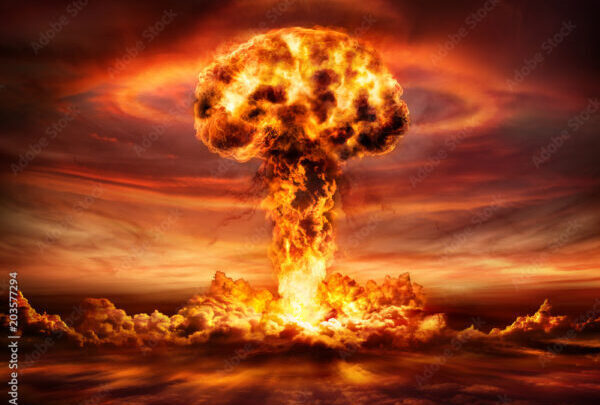Amid the annual commemoration of the International Day against Nuclear Tests today, the President of the General Assembly warned that the world is closer than any other time in this century to global catastrophe and stressed the urgent need to enter into force the Comprehensive Nuclear-Test-Ban Treaty.
Csaba Kőrösi (Hungary) noted that in 2010, the General Assembly declared 29 August the International Day against Nuclear Tests. Yet, today, there is little reason to celebrate amid heightened distrust, geopolitical competition, and a growing number of armed conflicts. The regular threats of resorting to a nuclear strike in the ongoing war against Ukraine have raised alarm; however, the response has been global military spending reaching a record $2.2 trillion in 2022. Urging the remaining Annex 2 countries to finally sign and ratify the Comprehensive Nuclear-Test-Ban Treaty (CTBT), he emphasized that “the so-called ‘limited nuclear war’ does not exist” and called on Member States “to put an end to the threat of our collective suicide”.
Izumi Nakamitsu, High Representative for Disarmament Affairs, underscored that the Treaty remains a testament to the international community’s united resolve to consign nuclear tests to history. However, while the unilateral moratoria against tests adopted by nuclear-weapon States are to be commended, they are no substitute for a legally binding prohibition against all nuclear tests. She recalled that Trinity — the first-ever nuclear detonation in 1945 — marked the beginning of an era of over 2,000 nuclear tests that have had lasting, devastating impacts on the environment, health, and security in some of the world’s most fragile ecosystems, home to some of its most vulnerable people. “The only way to prevent the reversal of the gains made in pursuit of an end to nuclear testing is to bring the CTBT into force and to do so without delay,” she stressed.
Robert Floyd, Executive Secretary of the Comprehensive Nuclear-Test-Ban Treaty Organization, described Hiroshima as “certainly the largest almost-instantaneous obliteration of humans, by humans”. The weapons built and tested since then have far more explosive power. Also spotlighting the more than 2,000 nuclear tests since 1945, he noted that when he was 14, there had been over 1,000 nuclear-weapon-test explosions. Thanks to the Treaty, a child who is 14 in 2023 “has lived through just five tests, all by one country”.
Vivian Okeke, Director of International Atomic Energy Agency (IAEA) Liaison Office in New York, said that for almost 70 years, IAEA has helped prevent the spread of nuclear weapons while making nuclear science and technology available for peaceful purposes, especially to developing countries in areas such as energy, health and agriculture. The Agency is also the global platform for strengthening nuclear security, with States increasingly seeking its help in minimizing the risk of nuclear material falling into the hands of terrorists.
Elias Merad Taouli, youth activist for Reverse the Trend: Save our People, Save our Planet, stressed that over 315 nuclear tests were conducted in the Pacific, “equivalent to more than 10,000 Hiroshima bombs”, and 415 were conducted in Kazakhstan. To this day, the consequences continue to cast a long shadow, with mothers having miscarriages, children being born with birth defects and all experiencing adverse physical and mental health effects. Recognition, reconciliation and reparations by nuclear perpetrators are long overdue, he stressed.
In the ensuing debate, Member States warned that, with rising geopolitical tensions, nuclear weapons and their proliferation represent an “existential threat” to humanity. They echoed calls for the entry into force of the Treaty, while also urging nuclear-weapons States to uphold their responsibilities towards those countries and people affected by nuclear testing.
The representative of Kiribati recounted his country’s tragic legacy of 33 nuclear tests carried out by the United Kingdom and the United States in the 1950s and 1960s. Not provided with proper individualized protective gears, Kiribati citizens were advised to take shelter in open spaces under tarpaulin cover. Many later complained about untreatable illnesses, including cancer and congenital disabilities — most of which resulted in death. With the suffering continuing to this day, he called on the nuclear-weapon States concerned to provide targeted support, radiological clean-up of the island, victim assistance and environmental remediation.
Kazakhstan’s delegate expressed anxiety “about the rise of a disturbing belligerent rhetoric,” and signs of the potential revival of bloc mentality. This struggle for power is resulting in the rapid modernization and increased production of even more potent and advanced nuclear weapons. Pointing out that this causes the command-and-control systems of nuclear weapons States to become more vulnerable to cyberattacks, he stressed the need to expand the number of nuclear weapons-free zones and ensure greater cooperation among them.
Echoing that last point, the representative of Saint Vincent and the Grenadines, speaking for the Community of Latin American and Caribbean States (CELAC), noted that its member States are party to the 1967 Tlatelolco Treaty for the Prohibition of Nuclear Weapons, “which established our region as the first nuclear-weapons-free zone in a densely populated area”. Further, those States have signed and ratified the Comprehensive Nuclear Test Ban Treaty.
Similarly, Tunisia’s delegate, speaking for the African Group, reiterated its commitment to the African Nuclear-Weapon-Free Zone Treaty (“Treaty of Pelindaba”), which re-affirms the continent’s status as a nuclear-weapons-free zone and as a shield for the African territory, including by preventing the stationing of nuclear explosive devices there and prohibiting weapons testing.
Sudan’s representative, speaking for the Arab Group, underscored that the total elimination of nuclear weapons is a realistic and feasible goal, rejecting the argument that the possession of them is necessary for international security. Calling on the nuclear States to implement the agreed goals and fully eliminate their nuclear arsenals, he stressed: “This is the least these countries can do to compensate the international community for the intimidation and massive and long-term damage caused by thousands of nuclear tests they have carried out”.
UN


Leave a Reply
You must be logged in to post a comment.